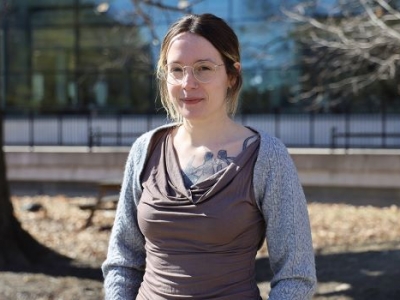–The following story was written by Taia Goguen-Garner
Everyone is aware of climate change but something we don’t really think about is “the market” behind climate change and who makes the decisions in terms of the future of climate change.
 For his research, Matthew Peters, a master’s student in Political Economy is looking at the dynamics of power relations in carbon emissions mitigation strategies in Canada.
For his research, Matthew Peters, a master’s student in Political Economy is looking at the dynamics of power relations in carbon emissions mitigation strategies in Canada.
“How we respond to climate change, act on carbon mitigation (or not) will produce an array of potential outcomes that affect people on a daily basis,” says Peters.
He explains that carbon-pricing strategies, like a carbon tax or a cap-and-trade system, are market-oriented solutions as opposed to labour-oriented solutions. “So my research is interested in the flip-side of the equation: If we are going to centre our response to climate change by putting ‘the market’ first, what effects might this have on the interests of labour?”
Peters’ research brings attention to the political aspects of climate change and how the future of climate change is in the hands of politicians.
“What gets lost in how climate change is covered is that it represents an alarming pathway to further increase and entrench inequality throughout the globe, both between nations and within nations,” shares Peters. “Instead, all we see on the news is one political leader speaking in juxtaposition to another, usually about one facet of the issue, a carbon price, and the day-to-day human element of things like precarious work, food insecurity, income inequality in relation to climate change remain hidden.”
Peters says that the most obvious “fix” to climate change would be a transition to a low-carbon economy. He describes a low-carbon economy as an economy that is powered by renewable energy sources as opposed to fossil fuels. Peters notes that Canada is one of the slowest moving countries when it comes to this transition.
The master’s student says this transition is a complex political issue and, at the end of the day, climate change boils down to who/what comes first ‒ the market or the people ‒ and all this intertwines with politics.
Peters has a background working with the Canadian Labour Congress supporting the Federal Government’s initiatives to phase out coal-fired electricity, the CLC is working to make sure this transition goes smooth for coal workers called Just Transition. The Labour Congress is working on phasing out coal-fired electricity ultimately resulting in coal workers being out of work and the economy of rural areas being affected by this switch. This phase-out is set to be finished by 2030.
Peters explains that the term ‘Just Transition’ refers to a type of framework for social intervention to secure the jobs and livelihoods of workers and their greater community.
“My approach to Just Transition is that there is no definitive roadmap to it, where you need to follow a long list of directions in order for it to be just transition. Rather it is a starting point that centres health and income security for workers and their communities over that of the private market and where you end up depends on your political outlook.”
Peters is continuing his research looking at the dynamics of power relations in carbon emissions mitigation strategies in Canada.
For more information about the master’s degree in Political Economy, please click here.
Wednesday, February 6, 2019 in Grad Student Research, News
Share: Twitter, Facebook




